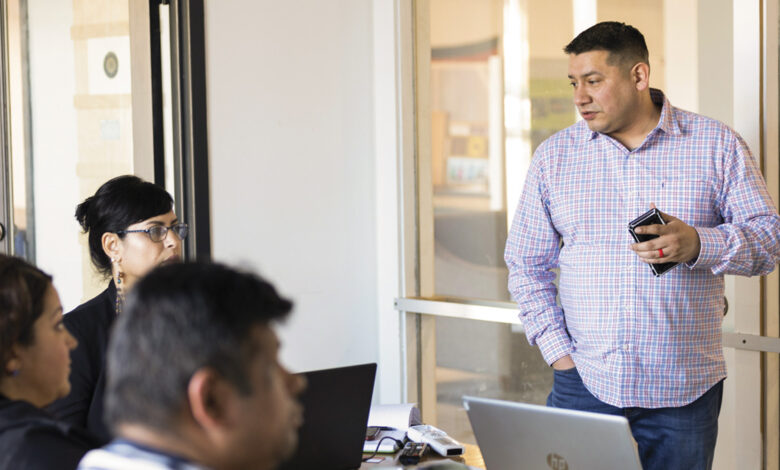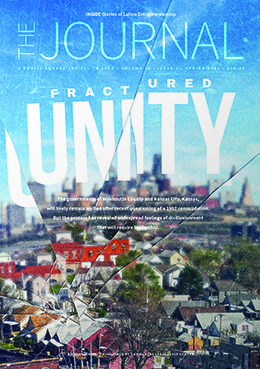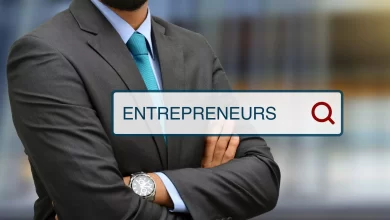How Gabe Muñoz nails the needs of KCK entrepreneurs

When sharp-dressed strangers in suits visited his childhood house, it ignited a spark in 9-year-old Gabe Muñoz.
Although he didn’t know them, he was taken with their appearance and the presence they brought into his great-grandparents’ home in Mexico City.
“It was the very first time that I ever saw anybody wear a suit that looked Latino,” Muñoz says. “I remember asking my mom, ‘Hey, who are those guys? What do they do?’ And she said, ‘They’re businessmen.’ I was like, ‘Oh. I like the way they dress. They look good.’ And I thought to myself, I want to be a businessman when I grow up.”
Modern-day Muñoz didn’t land too far from the childhood dream: He’s the founder of The Toolbox, which bills itself as the “go-to resource for everything small business” in Wyandotte County. The nonprofit specializes in reducing barriers for Latino entrepreneurs to “create a more inclusive and equitable entrepreneurial ecosystem.”
The Toolbox was born from a mix of professional research and personal ambition. In 2019, Muñoz was named the director of the Kansas City ESHIP Communities initiative, funded by the Ewing Marion Kauffman Foundation. He was charged with identifying barriers to local entrepreneurship, pinpointing existing gaps in services and brainstorming possible solutions.
Muñoz was familiar with such markers, for he grew up watching his father struggle to maintain a small business. He even changed his major in college in the hopes of learning enough to address his father’s challenges as a small-business owner.
After college, he worked at the Hispanic Chamber of Commerce of Greater Kansas City as its director of sales.
“I didn’t come to the position with this mentality of ‘go out and sell and sell’ to people. I just went out and talked to people to learn their stories, figure out what were problems and issues they were running into, trying to see if there’s any way I can help them,” Muñoz says. “My end goal was to knock on doors and meet business owners where they were at.”
Can entrepreneurship guarantee economic mobility?
When Muñoz was in third grade – shortly after meeting those men in suits – his school held a fundraiser selling chocolate bars. It was a prime opportunity for him to flex business credentials.
According to Muñoz, his mother persuaded the school to give him and his brothers extra candy to sell. She would drop off the pack in front of an office building in downtown Topeka, where Muñoz learned the rough-goings of cold sales.
“The first day I would go up to people and say ‘Hi, would you like to buy candy?’ People right away say, ‘No, no, no.’ I was like, ‘Oh, man, this is hard.’ But I figured that if I changed my approach, I would get different responses,” Muñoz says.
“I learned that messaging was important. So I started going up to people and asking ‘Hi, can you help me?’ They would pause … and they’d say, ‘Yes.’”
Muñoz says he ended up selling the most chocolate bars nationwide that year – 900 in a week’s time. A ceremony was held at the school, where officials from the fundraiser held an assembly to bestow on Muñoz a special plaque that he still has to this day.
As a teenager, he helped his father at the family business: a shop selling retail and grocery items from Mexico, international calling cards and, he says, “the first place in the Midwest where you could find music in Spanish.”
The family of 11 would run registers, stock shelves and take trips to Mexico to shop for products.
“We were very hands-on kids. We went from being on food stamps to being able to get off of all the federal assistance,” Muñoz says. “My dad was able to provide comfortably for his family. That’s nine of us kids.”
The Muñoz family saw how entrepreneurship can help move families up economically.
Research does suggest that entrepreneurship can be a strong vehicle for economic mobility or stability.
A 2020 study from the University of North Carolina’s Kenan-Flagler Business School found a significant relationship between entrepreneurship and economic mobility in the U.S., tracking an increase in a person’s self-determined economic mobility after becoming self-employed.
Additionally, a 2023 report from the Stanford University Graduate School of Business characterizes Latino-owned businesses as resilient, pointing to a nationwide trend of Latino-owned businesses recovering at a slightly faster rate than white-owned businesses – despite being disproportionately impacted by the COVID pandemic.
On the other hand, as Muñoz’s family experienced, entrepreneurship can exacerbate the racial wealth gap if a business fails. Recent research from Brandeis University found that Black-owned businesses were less likely to remain open four years after their start, and that, due to this disparity, “Black business owners are more likely to experience downward economic mobility and less likely to experience upward mobility, compared to their white counterparts.”
“Like a lot of small businesses, my dad tried to do everything by himself,” Muñoz says, ‘from stocking shelves to filling inventory to doing all the taxes and paperwork. He eventually fell behind … and had to make the decision to close the business and come to an agreement with the IRS on some type of payment plan.”
“ … I thought to myself, I want to be a businessman when I grow up.”
That’s why The Toolbox focuses on empowering entrepreneurs of color to find success in the long term rather than put all their efforts behind just increasing the rate of entrepreneurship.
That mission uplifts entrepreneurs such as Virginia Mercado, the founder and CEO of Thunderlight Work Boots in Kansas City, Kansas. She had been in business for two years when she first heard about The Toolbox, and says she was initially skeptical of the nonprofit. She had had negative experiences with other support organizations.
“However, after attending one of their classes, I was pleasantly surprised to discover how willing they were to help a non-English speaking immigrant who was also a single mother,” Mercado says.
She added that after taking courses with The Toolbox, she created a business plan that she calls “instrumental” in securing a grant from the Unified Government of Wyandotte County and Kansas City, Kansas. Mercado also was able to develop a plan for sales growth, which she says has helped her obtain her first business loan after repeatedly being denied.
“The Toolbox’s commitment to empowering small businesses like mine has had an incredible impact, not only on me but also on my community,” Mercado says. “Their tireless efforts to support and uplift small businesses have not gone unnoticed, and I am confident that many others, like me, have benefited from their work.”
Education, not just motivation
When Muñoz was named the director of the Kansas City ESHIP Communities initiative in 2019, he assembled a council to survey small-business owners in the community to identify key barriers entrepreneurs face.
Their research outlined four: trust issues amongst entrepreneurs toward service providers being able to meet their specific needs, cultural competency challenges on the side of entrepreneurial support organizations, lack of multilingual programs, and entrepreneurs’ lack of awareness of existing resources.
“We want to create independence for our clients,” says Yvette Solis, director of economic empowerment at El Centro, a community partner with The Toolbox.
Solis cites culture shock, technology and a lack of access to information as stressors for entrepreneurs. Resources need to extend beyond just handing them a check.
“We give financial literacy classes, teach them about credit, home-buying. We do budgeting as well,” she says. The Toolbox offers similar expertise on access to capital, permits and what different levels of government require from business owners.
The Toolbox has several Spanish-speaking individuals on staff, which Solis says builds confidence for entrepreneurs with a language barrier, allowing them to better communicate their vision and any challenges they face. El Centro and The Toolbox regularly send clients to each other to help build a rounded education.
Muñoz believes that language and culture are factors in the trust between an individual and an institution. During his ESHIP survey, participants admitted to feeling distrustful of organizations, and they thought that information related to their entrepreneurial ambitions “was being held for selective view.”
“I don’t think that is ever the intention of organizations,” Muñoz says. “It’s just that there is no communication or relationship there. And because there’s no communication, people feel like they’re siloed and that ‘The Other’ doesn’t care about them.”
For example, he says, quite a few businesses of color were not aware of their eligibility for Paycheck Protection Program loans or similar measures during the COVID pandemic.
“A lot of people were hesitant, even thinking that I was trying to scam them,” Muñoz says. He was able to achieve a small grant to contract accountants to help small-business owners get their books in order, which helped build a trusting relationship.
Pedro Morales, owner of Quality Framing & Art in Mission, credits Muñoz for giving him the skills necessary to start his business. Muñoz taught him how to apply for a business license, create his store’s website, pay business taxes and helped him apply for local grants.
“My English is poor, and he helped me understand so much,” Morales says. “We are still connected (beyond just starting Quality Framing). He’s a great person; they’re a great team. Good people.
“Sometimes when you want to start a business you freak out. You have fear. Like, ‘How do I do this?!’” Morales says. “If there’s a business struggling in one way or another, they should go to The Toolbox. They are a very helpful offer to the community.”
Solis, the director at El Centro, says that the attention Muñoz provides to his client goes beyond the routine.
“If we don’t have an answer for clients, we tell them, ‘Just go to Gabe! Go to the Toolbox!’ That trust he’s built with the community is essential,” she says.
Since its founding, The Toolbox has assisted 115 entrepreneurs in launching their businesses, according to Muñoz. Another 225 individual entrepreneurs were helped. 70% of those were immigrant entrepreneurs.
“I get hit up by quite a few people saying they wish they could do something similar to us, but I don’t think we have any secret sauce. We just go out and talk to people,” Muñoz says. “We started with no money and built a brand by word of mouth.”
While encouraging growth for other entrepreneurs, Muñoz says The Toolbox has its own goals too: opening locations in other Kansas cities and expanding its programming to languages beyond English and Spanish.
In the meantime, Muñoz continues to diversify Kansas City’s entrepreneurial landscape, showing others that they don’t have to wait for strangers in suits to validate their dreams.

A version of this article appears in the Spring 2024 issue of The Journal, a publication of the Kansas Leadership Center. To learn more about KLC, visit http://kansasleadershipcenter.org. Order your copy of the magazine at the KLC Store or subscribe to the print edition.



